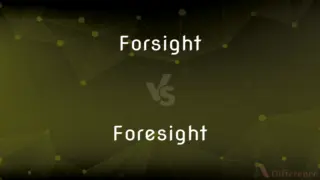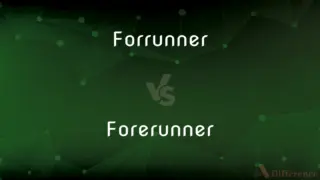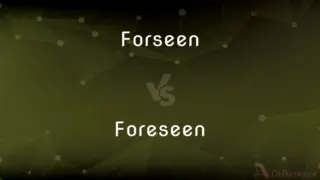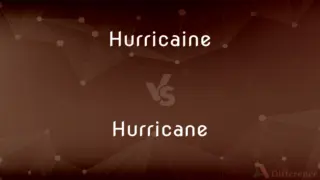Beeing vs. Being — Which is Correct Spelling?
By Tayyaba Rehman — Updated on March 18, 2024
"Being" refers to the state or existence of a person or thing, while "beeing" is not a standard English word and may represent a typographical error or a colloquialism.

Table of Contents
Which is correct: Beeing or Being
How to spell Being?

Beeing
Incorrect Spelling

Being
Correct Spelling
ADVERTISEMENT
Key Differences
"Being" is a word entrenched in English, primarily serving as nouns or verbs.
As a noun, "Being" represents the existence or the nature of a person or thing.
As a verb, "Being" is the present participle of "be," expressing ongoing or continuous action.
"Beeing," on the other hand, is not recognized in formal English dictionaries or lexicons. In typical usage, it may be considered a typographical error— a misspelling of "being."
In digital communication, intentional misspellings like "beeing" can also be a form of internet language or meme culture, though it's not as commonly seen. Despite these possible interpretations, "being" is almost certainly the correct term in formal and informal contexts.
ADVERTISEMENT
In certain informal or colloquial contexts, "beeing" may be deliberately used. For example, it could be a playful term related to the activity of bees or beekeeping. It's important to clarify the context, as this usage is far from standard.
How Do You Spell Being Correctly?
Incorrect: Are you beeing serious right now?
Correct: Are you being serious right now?
Incorrect: They are beeing considered for the job.
Correct: They are being considered for the job.
Incorrect: He didn't like beeing alone in the dark.
Correct: He didn't like being alone in the dark.
Incorrect: She was beeing very quiet in the library.
Correct: She was being very quiet in the library.
Incorrect: I enjoyed beeing part of the team.
Correct: I enjoyed being part of the team.
Being Definitions
Existence.
The railway brought many towns into being.
The single market came into being in 1993.
In the context of gerunds, "being" is the noun form of the verb "be," as in phrases like "Being kind is important."
Being a good listener is an essential quality in a friend.
(obsolete) An abode; a cottage.
The state or fact of existing.
A point of view gradually coming into being.
As a noun, "being" also refers to a living creature or entity, especially a sentient one.
A strange being from another planet visited us.
In philosophy, being is the material or immaterial existence of a thing. Anything that exists is being.
A real or imaginary living creature or entity, especially an intelligent one
A rational being
Alien beings
Because; since. Often used with as or that.
All the qualities constituting one that exists; the essence.
The very being of human nature.
That which exists in any form, whether it be material or spiritual, actual or ideal; living existence, as distinguished from a thing without life; as, a human being; spiritual beings.
What a sweet being is an honest mind!
A Being of infinite benevolence and power.
A living creature.
The nature or essence of a person.
Sometimes one aspect of our being has been developed at the expense of the others.
The state or quality of having existence.
Technical advances that have only recently come into being.
In philosophy, "being" is a complex term often referring to the essential nature or existence of a person or thing.
In his work, the philosopher explored the concept of 'being' and what it truly means.
A person.
"The artist after all is a solitary being" (Virginia Woolf).
Present participle of be.
(philosophy) That which has actuality (materially or in concept).
"Being" serves as the present participle of the verb "be," used in the creation of continuous tenses.
I am being very patient with you.
The totality of all things that exist.
An individual form of life; an organism.
"We [humans] are the only beings who are aware that we shall die" (Seyyed Hossein Nasr).
An imaginary, conjectural, or supernatural creature.
Extraterrestrial beings.
One's basic or essential nature
"[My grandfather's] face, words and gestures are a permanent part of my being" (Duane Nitatum).
The state or fact of existence, consciousness, or life, or something in such a state.
(philosophy) One's basic nature, or the qualities thereof; essence or personality.
Given that; since.
Existing.
A man who is being strangled.
While the article on Burns was being written.
Fresh experience is always being gained.
Existence, as opposed to nonexistence; state or sphere of existence.
Lifetime; mortal existence.
Claudius, thouWast follower of his fortunes in his being.
An abode; a cottage.
It was a relief to dismiss them [Sir Roger's servants] into little beings within my manor.
A living thing that has (or can develop) the ability to act or function independently.
"Being" denotes existence or living; it's the state of simply 'being' alive or real.
She appreciated the simple joy of being."
Being Meaning in a Sentence
Being on time shows respect for other people's time.
She was being careful with the glass vase.
Studying is essential to being successful in school.
Being kind to others can make a big difference in their day.
Being a part of that event was a memorable experience.
Being in the first row at the concert was an amazing experience.
He was being helpful by carrying the groceries.
Honesty is an important part of being a good friend.
He was being silly to make his friends laugh.
Being the youngest in the family had its advantages.
He loved being in the kitchen and cooking meals.
She was being responsible by doing her homework on time.
She was being honest when she admitted to breaking the vase.
Being patient is important when learning a new skill.
She was being cautious when walking on the icy sidewalk.
Being able to read well is important for learning.
He was being very brave at the dentist.
Being creative helps you solve problems in unique ways.
He was being optimistic about finding a lost item.
Being part of a team means working together.
Being in nature can be very relaxing.
The weather was being unpredictable during their trip.
Being involved in community service is rewarding.
She found being quiet challenging during the game.
Being a good listener is as important as being a good speaker.
Being Idioms & Phrases
Being on cloud nine
Feeling extremely happy or elated.
After hearing the good news, she was being on cloud nine all day.
Being in hot water
Being in trouble or in a difficult situation.
After breaking the window, he knew he was in hot water.
Being a wet blanket
Being a person who spoils other people's fun.
He didn’t want to join the game, being a wet blanket as usual.
Being a breath of fresh air
Being refreshing or innovative.
His new approach to teaching was a breath of fresh air for the curriculum.
Being all ears
Listening intently; fully focused or awaiting an explanation.
When she mentioned she had a surprise, I was all ears.
Being a stone's throw away
Being very close in distance.
The beach is just a stone's throw away from their house.
Being a fly on the wall
Being able to observe events without being noticed.
I'd love to be a fly on the wall during their secret meeting.
Being on the same page
Agreeing or having the same understanding or opinion.
It's important for the team to be on the same page before the presentation.
Being the life of the party
Being a person who brings energy and fun to a social gathering.
She's always being the life of the party, making everyone laugh.
Being as clear as mud
Being very confusing or unclear.
The instructions he gave were as clear as mud.
Being a chip off the old block
Being similar to one's parents in behavior or traits.
He's just like his father, a real chip off the old block.
Being a dark horse
Being a person who surprises others by showing a talent not previously known.
She was a dark horse in the competition, winning against all odds.
Being in seventh heaven
Feeling ecstatic or extremely happy.
Being accepted into her dream college put her in seventh heaven.
Being caught red-handed
Being caught in the act of doing something wrong.
The thief was caught red-handed by the police.
Being on thin ice
Being in a risky situation where one can easily get into trouble.
After the last mistake, he's on thin ice with his boss.
Being on pins and needles
Feeling anxious or nervous.
She was on pins and needles waiting for the exam results.
Being in the same boat
Being in the same situation or facing the same problems.
We're all in the same boat with this tough assignment.
Being under the weather
Feeling ill or not well.
I'm sorry, but I can't come in today; I'm feeling under the weather.
Being over the moon
Being extremely pleased or happy.
He was over the moon about getting the promotion.
Being a piece of cake
Being very easy to do.
The math test was a piece of cake for her.
Common Curiosities
What is the meaning of Beeing?
"Beeing" is not recognized as a standard English word. It might represent a typographical error for "being," or in informal contexts, it could refer to activities related to bees or beekeeping.
What is being in question?
"Being in question" refers to the existence or state that is currently being discussed or doubted. For example, "The being in question was found to be a rare species of bird."
What is a being verb in a sentence?
A being verb, also known as a linking verb, connects the subject of a sentence to more information about the subject. An example is: "She is a teacher."
What are two verbs of being?
Two verbs of being are "am" and "is," which are present tense forms of the verb "to be."
What are the six verbs of being?
The six primary verbs of being are: "am," "is," "are" (present tense), "was," "were" (past tense), and "been" (past participle).
What is meant by my being?
"My being" is a phrase where "being" acts as a gerund, and "my" is a possessive adjective. It refers to one's existence or essence, as in "My being here is due to an urgent matter."
Is it correct to say being?
Yes, it is correct to use "being" in sentences where it functions as a present participle, gerund, or noun.
Is with that being said Grammatically correct?
Yes, "with that being said," is grammatically correct and is commonly used in both speaking and writing to introduce a new or contrasting idea.
How do you start a sentence with being?
A sentence can start with "being" when it is used as a gerund or a present participle. For example, "Being punctual is important."
What is the present continuous tense of being?
The present continuous tense of "being" is "am being, "" is being," or "are being," such as in the phrase "I am being serious."
What is state of being in grammar?
In grammar, a state of being refers to a condition or situation that exists. Verbs that express the state of being are called linking or state of being verbs, such as "am," "is," "are," "was," "were," "be," "being," "been."
Is being past continuous?
No, "being" isn't past continuous. It's the present participle of the verb "to be," used in present continuous tenses or as a gerund.
Can you begin a sentence with a gerund?
Yes, a sentence can start with a gerund, which is a verb ending in "-ing" that functions as a noun. For example, "Running helps me to relieve stress."
How is being used in English?
In English, "being" is used in several ways: as a present participle (e.g., "They are being loud"), a gerund (e.g., "Being late is bad"), or a noun referring to existence (e.g., "The beauty of being").
Is being a verb or a gerund?
"Being" can function both as a verb (present participle of "to be") and a gerund (the "-ing" form of a verb that functions as a noun).
What can I use instead of being?
Instead of "being," you can use "existence" when "being" is used as a noun. When it's used as a present participle, it is specific to the verb "to be" and has no exact synonyms.
What is the past tense of being?
The past tense of "being" is "was" or "were," depending on the subject.
Can simple sentences start with being?
Yes, simple sentences can start with "being" as a gerund or a present participle. For example, "Being aware of the situation, I decided to leave."
What is the plural form of being?
"Being" is both singular and plural. As a noun denoting existence, it doesn't have a plural form. As a present participle or gerund, it doesn't require pluralization.
How do you use being?
"Being" can be used as a noun, as in "Human beings are capable of empathy." It can also be a verb, as in "She is being honest." As a gerund, it's used as "Being honest is important."
What is the difference between been and being?
"Been" is the past participle of the verb "to be," used after "have" or "has," as in "I have been to Paris." "Being" is the present participle used to form continuous tenses, as in "I am being serious."
Can sentences start with being?
Yes, sentences can start with "being," especially when it is used as a gerund or a participle, such as "Being a chef, he knows many recipes."
What verb form is being?
"Being" is the present participle form of the verb "to be."
What is the opposite of being called?
The opposite of "being" could be "nonexistence" or "non-being." There isn't a direct opposite for "being called," but one might use "being ignored" or "being unnamed."
When should I use being?
"Being" should be used when you need a present participle of the verb "to be," a gerund, or a noun referring to existence.
Can I use that being said in writing?
Yes, "that being said" can be used in writing. It's often used to introduce a contrasting or qualifying statement.
Is there a comma after that being said?
Yes, usually, there is a comma after "that being said" when it begins a sentence, as it serves as a transitional phrase. For example, "That being said, we still have much to learn."
How do you say professionally with that being said?
In a professional setting, you might say, "Given what has been mentioned, ""Considering the foregoing," or "With the above in mind."
How do you use being in a sentence example?
As a present participle: "I am being sincere." As a gerund: "Being kind is a virtue." As a noun: "She values the joy of simply being."
What is the meaning of our being?
"Our being" is similar to "my being," with "our" as a possessive adjective. It denotes collective existence or a shared state, as in "Our being here is a result of shared interest."
What are the three forms of being?
The three forms of "being" as part of the verb "to be" are "is/am/are" (present), "was/were" (past), and "been" (past participle).
What is an example of being?
"Being" as a noun: "She pondered the nature of her being." "Being" as a verb: "She is being very helpful today."
Can I start a paragraph with being?
Yes, a paragraph can begin with "being" when it's employed as a gerund or participle, as in "Being a good listener is crucial in communication."
What is the verb 3 of being?
The third form or the past participle of "to be" is "been."
Can we use being for past?
No, "being" isn't used for past tense. It's the present participle of the verb "to be." The past participle is "been."
How do you use being as a noun?
As a noun, "being" can be used to describe existence or a living entity. For example, "The mystery of human being fascinates scientists."
How do you use being as a helping verb in a sentence?
In a sentence, "being" can act as a helping verb in continuous tenses, such as "She is being very quiet today."
How do you use being in a gerund sentence?
A sentence using "being" as a gerund could be: "Being honest is the best policy."
What is the formal version of that being said?
A formal version of "that being said" might be "Nevertheless," "However," "Nonetheless," or "In light of this."
What is an example of being said that?
An example of a sentence with "that being said" is: "That being said, we should consider all possible outcomes before making a decision."
What is the meaning without being said?
"Without being said" is a phrase often used to denote something that is so obvious or understood that it doesn't need to be mentioned or explained.
Is being a noun or adjective?
"Being" can function as a noun referring to the existence or a sentient entity. It's not typically used as an adjective.
Which is an example of being?
Example of "being" as a noun: "We discussed the nature of being." As a gerund: "Being responsible is important." As a present participle: "They are being careful."
What is the difference between that being said and having said that?
There's no substantial difference between "that being said" and "having said that. " Both phrases serve as transitions and can introduce a contrasting idea.
What is the meaning of bee ing?
"Bee-ing" is not a recognized term in English. It may be a play on words relating to the behavior or activity of bees.
What is the act of being opposite?
The act of being opposite would likely refer to nonexistence or oblivion.
Share Your Discovery

Previous Comparison
Uneligible vs. Ineligible
Next Comparison
Pesky vs. PestyAuthor Spotlight
Written by
Tayyaba RehmanTayyaba Rehman is a distinguished writer, currently serving as a primary contributor to askdifference.com. As a researcher in semantics and etymology, Tayyaba's passion for the complexity of languages and their distinctions has found a perfect home on the platform. Tayyaba delves into the intricacies of language, distinguishing between commonly confused words and phrases, thereby providing clarity for readers worldwide.










































